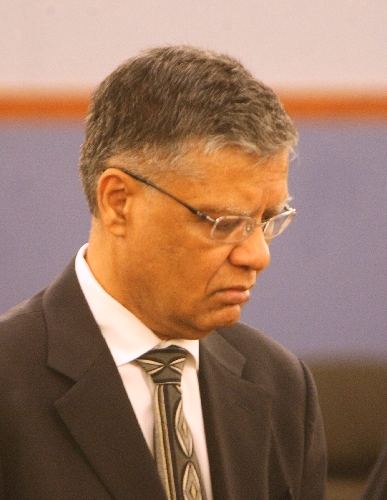Judges starts process to determine Desai competency for trial

District Judge Jackie Glass Thursday ordered Dr. Dipak Desai’s attorneys to gather his medical records and turn them over to the court in two weeks so that independent evaluations can be done to determine his competency to stand trial.
Glass said she will provide the records to the physicians who will be chosen by a court-approved panel of experts to conduct the evaluations of the doctor charged in the 2007 hepatitis outbreak.
She set an Aug. 12 status check in the case.
Desai walked into the courtroom Thursday unassisted and standing tall. He showed no emotion and said nothing during the 10-minute hearing, while sitting stiffly at the defense table with his hands clasped together always looking straight ahead.
Afterward, Desai remained silent as he left the courthouse holding hands with his wife, Kusum.
Last week, District Judge Donald Mosley had ordered the criminal case against Desai transferred temporarily to Glass to oversee the medical evaluations. Glass handles all issues involving the competency of defendants in District Court.
Desai, 60, a gastroenterologist who gave up his license to practice medicine following the outbreak, is set to stand trial March 14 on several felony charges, including racketeering, insurance fraud and neglect of patients. Two of his former nurse anesthetists, Keith Mathahs and Ronald Lakeman, are also charged in the case.
The charges revolve around the health cases of seven people authorities say were infected in 2007 with the potentially deadly hepatitis C virus at Desai’s Endoscopy Center of Southern Nevada.
If the medical evaluations show that Desai is competent to assist his lawyers, Glass will transfer his case back to Mosley.
Desai’s lead criminal attorney, Richard Wright, said in court papers last week that a July 2008 stroke left Desai with a “cognitive impairment” that diminished his ability to assist his lawyers. He repeated that contention after Thursday’s hearing.
“He’s impaired,” Wright said. “The question is the extent of his impairment.”
But prosecutors have challenged that claim.
“Malingering is a huge issue for the state,” Chief Deputy District Attorney Mike Staudaher told Glass on Thursday.
Staudaher filed court papers last month accusing Desai of hiding “behind a curtain of mental and physical impairment so he can avoid facing consequences of his actions.”
The Review-Journal reported last week that a lawyer suing Desai’s clinic for malpractice had accused Desai in 2008 of not being truthful about claims his medical condition wouldn’t allow him to answer questions at a deposition for more than an hour.
Contact Jeff German at jgerman@review
journal.com or 702-380-8135 or read more courts coverage at lvlegalnews.com.